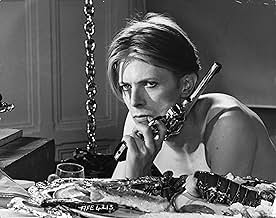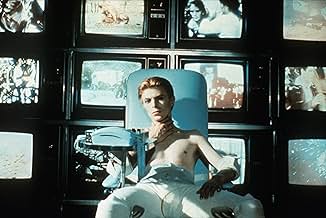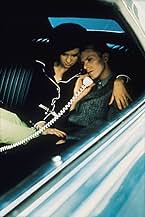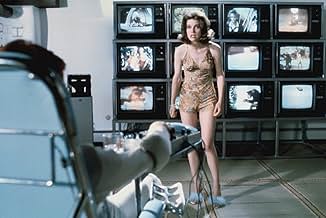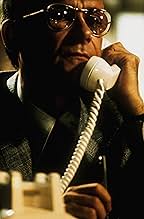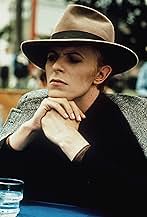VALUTAZIONE IMDb
6,6/10
30.310
LA TUA VALUTAZIONE
Un alieno deve fingere di essere umano per salvare il suo pianeta morente, ma una donna e l'avidità di altri uomini creano complicazioni.Un alieno deve fingere di essere umano per salvare il suo pianeta morente, ma una donna e l'avidità di altri uomini creano complicazioni.Un alieno deve fingere di essere umano per salvare il suo pianeta morente, ma una donna e l'avidità di altri uomini creano complicazioni.
- Premi
- 1 vittoria e 4 candidature totali
Jim Lovell
- Capt. James Lovell, Commander of Apollo 13
- (as Capt. James Lovell)
Dort Clark
- Waiter
- (non citato nei titoli originali)
Recensioni in evidenza
Several things about this film make it worth watching... beginning with the premise that Earth's abundant water is what makes it rare in the galaxy.
But more intriguing is how the alien visitor, landing with absolutely nothing but the clothes on his back and a gold wedding ring, and knowing absolutely nothing about Earth culture, "gets up to speed" with astonishing, ruthless, clear-sighted rapidity...within days raising the $10,000 he offers a patent attorney for one hour of the latter's time. In that hour, Bowie's character outlines three basic patents -- including two which we can recognize today as digital cameras and music.
A particularly fascinating scene has our newly rich and already bored alien watching about 20 TV sets at once, while holding a small, battery-powered propeller. Repeated viewings will reveal that the disparate programs (presumably actual images of television shows) occasionally "come together" to form coherent messages... at which time our hero spins the propeller.
But more intriguing is how the alien visitor, landing with absolutely nothing but the clothes on his back and a gold wedding ring, and knowing absolutely nothing about Earth culture, "gets up to speed" with astonishing, ruthless, clear-sighted rapidity...within days raising the $10,000 he offers a patent attorney for one hour of the latter's time. In that hour, Bowie's character outlines three basic patents -- including two which we can recognize today as digital cameras and music.
A particularly fascinating scene has our newly rich and already bored alien watching about 20 TV sets at once, while holding a small, battery-powered propeller. Repeated viewings will reveal that the disparate programs (presumably actual images of television shows) occasionally "come together" to form coherent messages... at which time our hero spins the propeller.
I first saw "The Man Who Fell to Earth" when it was first released, and found it to be a jumbled mess. There were plot holes galore, and scenes that went nowhere or had no connection to anything.
A few years back, I saw the director's cut, and it was an entirely different film. The plot holes were filled and all the scenes fit together perfectly. As bad as the original release version was, the director's cut is great and worth seeing.
A few years back, I saw the director's cut, and it was an entirely different film. The plot holes were filled and all the scenes fit together perfectly. As bad as the original release version was, the director's cut is great and worth seeing.
Maybe Starman David Bowie was born to play the title role in The Man Who Fell To Earth, an avant-garde disjointed sci fi film from director Nicolas Roeg.
Thomas Jerome Newton (David Bowie) is an alien who lands in New Mexico with some precious rings, a British passport and some rudimentary knowledge of patents. He needs to make money so he can build a rocket ship that can transport water to his dying planet.
Newton quickly makes money through his advanced business patents, he recruits a chief scientist (Rip Torn) who discovers that he is not what he appears to be and falls in love with hotel maid (Candy Clark) who also introduces him to the delights of gin & tonic.
The government intelligence service and rival businesses decide to look closely into his activities. They throw his patent lawyer and business associate (Buck Henry) out of the window and then hold Newton captive in a hotel plying him with gin.
The film plays with time as years go by and other characters age. We have flashbacks of Newton in his home planet with his family. The most memorable scenes is that of an alien with a British passport and the famous scene of Clark urinating her underwear when Newton reveals himself as an alien.
The film has a cult following but it is not a great film. It is too trippy and unstructured leading you to ask more questions than get any answers from it. Still I cannot think of anyone else who could had played the title role in that era and Bowie goes for it full frontal.
However the combination of Bowie and Roeg makes this a landmark science fiction film of the 1970s just as worthy as Close Encounters of the Third Kind.
Thomas Jerome Newton (David Bowie) is an alien who lands in New Mexico with some precious rings, a British passport and some rudimentary knowledge of patents. He needs to make money so he can build a rocket ship that can transport water to his dying planet.
Newton quickly makes money through his advanced business patents, he recruits a chief scientist (Rip Torn) who discovers that he is not what he appears to be and falls in love with hotel maid (Candy Clark) who also introduces him to the delights of gin & tonic.
The government intelligence service and rival businesses decide to look closely into his activities. They throw his patent lawyer and business associate (Buck Henry) out of the window and then hold Newton captive in a hotel plying him with gin.
The film plays with time as years go by and other characters age. We have flashbacks of Newton in his home planet with his family. The most memorable scenes is that of an alien with a British passport and the famous scene of Clark urinating her underwear when Newton reveals himself as an alien.
The film has a cult following but it is not a great film. It is too trippy and unstructured leading you to ask more questions than get any answers from it. Still I cannot think of anyone else who could had played the title role in that era and Bowie goes for it full frontal.
However the combination of Bowie and Roeg makes this a landmark science fiction film of the 1970s just as worthy as Close Encounters of the Third Kind.
How you feel about this movie depends on what you want out of it. I have two disclosures to make: first, I write reviews short and sweet, with the intention of countering those people who give mediocre films 9 stars out of ten because a film speaks to them in some way that it will not speak to others. Second, I am a die-hard Bowiephile.I watched this movie over and over and over again, for the sheer love of David Bowie. That said, I don't think this is a great film. In a few ways, its terrible. Most significantly, the screenplay and direction don't match well enough to make a very coherent or intelligible movie. It feels cheap and disjointed. If you haven't read the book, it will not make much of sense. As for performances, they are hit and miss. Bowie, many say, was exactly in his element doing this film in 75/76 when he was truly an alien living in L.A, wacked out on cocaine and out of touch with real life. How much he really acted was debatable-but if you like Bowie, seeing this film is a must. There are a few great visuals, including the cover shot used for the album LOW. This movie would have been better with a different director in my opinion, but it is what it is. A snapshot in time
I have just watched "The Man Who Fell to Earth" from beginning to end after seeing several scenes here and there from years of flipping past the sci-fi channel or whatever other channel this film might've been shown on. I must say that I think it is one of the most interesting films I've ever seen. Now before you start thinking this is going to be a review of blind worship, stop for a moment and remember that just because something is interesting doesn't mean it's likeable. Art is not meant to be appealing. It's meant to cause a reaction, it's meant to make you think, it's meant to make you uncomfortable. Art forces feelings upon you that you might rather not experience, so whether you like it or not, this film is a work of art. But some art...in fact a lot of art...is trash. Is this movie trash? Some say yes, some say not. Some think it's brilliant, others think it a waste of time. Some think the narrative's dependence on visual stimulus as opposed to linear storytelling is a touch of cinematic beauty, while others dismiss it as experimental tripe.
Somebody wrote a scathing review saying that if you like junk like "Lost Highway," you might enjoy this movie. Well, no offense meant, but I'd like to say that this person has made clear that he can't see past what's appealing. Why watch something that's unappealing you might ask? Because that's what art's supposed to do...it challenges you and your values. Sometimes it reinforces them, and sometimes it will blatantly attack them. You have to draw your own conclusions and interpretations. "The Man Who Fell to Earth" is no different. Yes, the film seems to jump from time to time, one scene juxtaposed with a scene that takes place 20 years later, a flashback that may or may not be a flashback, it is confusing. I know I was confused. It's not a linear narrative...it's telling a story through pictures, with occasional words just to make sure you have a little more than an inkling as to what you're supposed to be seeing. Personally, I would be interested to see the movie without dialogue...like "Aeon Flux," a story can be told philosophically and artistically without words.
What is the story? Well...quite simply, David Bowie, in his first and probably one of his best on-screen performances, is an alien on Earth trying to find a way to get water back to his world. Is it as simple as it sounds? Not by any means. But you have to believe it to see it. You will be confused, you might even be offended (there's a lot of sexually explicit scenes that border on pornography), but one way or the other, this film is meant to be visually stimulating. What you see will make you think...if you're repulsed by it and feel the urge to turn it off, then it's simply not your kind of movie.
On the whole, I like this movie, though I must be in a certain mood to watch it. It is not easy to watch, there are long stretches without dialogue, and when there is dialogue, it's often confusing. But no matter what, I like what I was seeing on the screen. I do feel like watching it again because I know there is more to absorb and take in, there's more to think about that I missed before. But that's the kind of person I am...I want to think, and I want that discomfort this movie gives me because I am alleviated by the need to solve it, not dismiss it. Bowie is in fine form, probably used to alienation being a Brit in America, and having played his own Ziggy Stardust character in the past. The rest of the cast performs rather competently, although nobody's performance shines as much as Bowie's (although Candy Clarke is pretty good in some scenes, and Rip Torn's deadpan performance is a bit of dry humor).
Dispute me if you must, I give this movie ***1/2 out of ****.
Somebody wrote a scathing review saying that if you like junk like "Lost Highway," you might enjoy this movie. Well, no offense meant, but I'd like to say that this person has made clear that he can't see past what's appealing. Why watch something that's unappealing you might ask? Because that's what art's supposed to do...it challenges you and your values. Sometimes it reinforces them, and sometimes it will blatantly attack them. You have to draw your own conclusions and interpretations. "The Man Who Fell to Earth" is no different. Yes, the film seems to jump from time to time, one scene juxtaposed with a scene that takes place 20 years later, a flashback that may or may not be a flashback, it is confusing. I know I was confused. It's not a linear narrative...it's telling a story through pictures, with occasional words just to make sure you have a little more than an inkling as to what you're supposed to be seeing. Personally, I would be interested to see the movie without dialogue...like "Aeon Flux," a story can be told philosophically and artistically without words.
What is the story? Well...quite simply, David Bowie, in his first and probably one of his best on-screen performances, is an alien on Earth trying to find a way to get water back to his world. Is it as simple as it sounds? Not by any means. But you have to believe it to see it. You will be confused, you might even be offended (there's a lot of sexually explicit scenes that border on pornography), but one way or the other, this film is meant to be visually stimulating. What you see will make you think...if you're repulsed by it and feel the urge to turn it off, then it's simply not your kind of movie.
On the whole, I like this movie, though I must be in a certain mood to watch it. It is not easy to watch, there are long stretches without dialogue, and when there is dialogue, it's often confusing. But no matter what, I like what I was seeing on the screen. I do feel like watching it again because I know there is more to absorb and take in, there's more to think about that I missed before. But that's the kind of person I am...I want to think, and I want that discomfort this movie gives me because I am alleviated by the need to solve it, not dismiss it. Bowie is in fine form, probably used to alienation being a Brit in America, and having played his own Ziggy Stardust character in the past. The rest of the cast performs rather competently, although nobody's performance shines as much as Bowie's (although Candy Clarke is pretty good in some scenes, and Rip Torn's deadpan performance is a bit of dry humor).
Dispute me if you must, I give this movie ***1/2 out of ****.
Lo sapevi?
- QuizThe picture was temporarily scored with music from Pink Floyd's album "The Dark Side of the Moon".
- BlooperWhen Mary-Lou takes Thomas to the hotel's fifth floor in the elevator instead of allowing him to use the stairs, she says, "It's five flights." This would be correct in the UK, but not in America; from the ground floor to the fifth floor of an American building is four flights.
- Citazioni
Thomas Jerome Newton: Ask me...
Nathan Bryce: What?
Thomas Jerome Newton: The question you've been wanting to ask ever since we met.
Nathan Bryce: Are you Lithuanian?
Thomas Jerome Newton: [grins] I come from England.
Nathan Bryce: Ah, that's not so terrible.
- Versioni alternativeThe US theatrical release of the film was drastically altered. Not only were 20 minutes cut (including the gun sequence) but some scenes were rearranged and a few scenes had different camera angles.
- ConnessioniEdited into We are the Robots (2010)
I più visti
Accedi per valutare e creare un elenco di titoli salvati per ottenere consigli personalizzati
- How long is The Man Who Fell to Earth?Powered by Alexa
Dettagli
- Data di uscita
- Paese di origine
- Lingua
- Celebre anche come
- El hombre que cayó a la Tierra
- Luoghi delle riprese
- Aziende produttrici
- Vedi altri crediti dell’azienda su IMDbPro
Botteghino
- Budget
- 1.500.000 USD (previsto)
- Lordo Stati Uniti e Canada
- 100.072 USD
- Fine settimana di apertura Stati Uniti e Canada
- 5922 USD
- 26 giu 2011
- Lordo in tutto il mondo
- 167.072 USD
- Tempo di esecuzione
- 2h 19min(139 min)
- Colore
- Mix di suoni
- Proporzioni
- 2.35 : 1
Contribuisci a questa pagina
Suggerisci una modifica o aggiungi i contenuti mancanti




